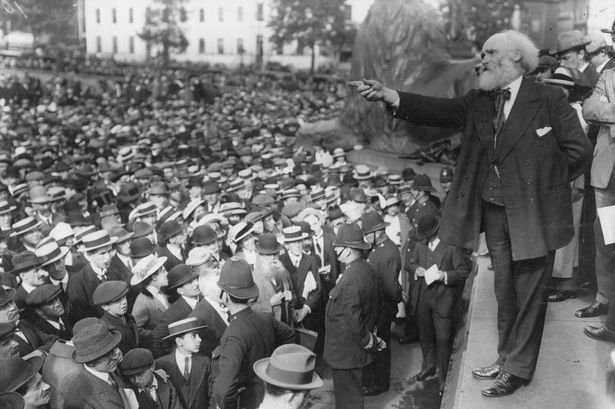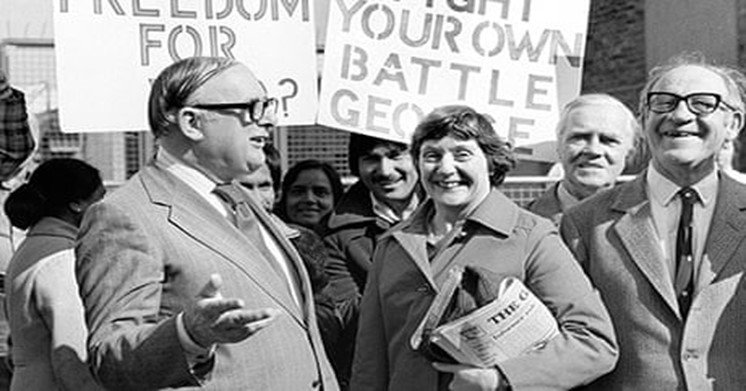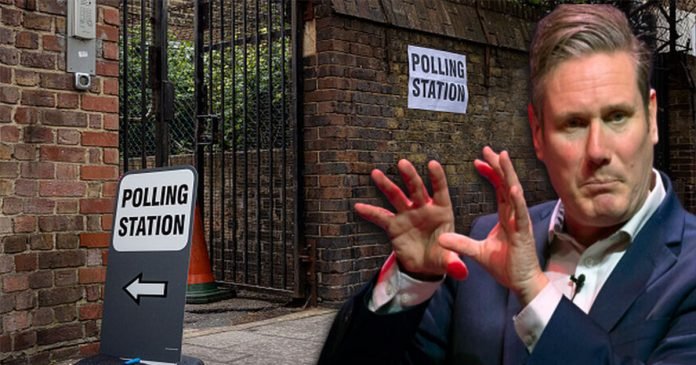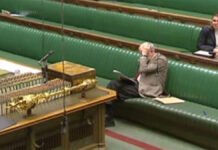Apathy…
Tony Benn stated: “General election campaigns have degenerated into an exchange of personal abuse which puts most people off; a flurry of election promises marketed by high-pressure salesmen; and the usual solemn warnings about apathy – as if the real problems in Britain were caused by the inactivity of the people, rather than the activity of the parliamentarians.
Apathy has its advantages for the political class – by which I mean the party leaders, their spin doctors and their embedded correspondents in the media, who live in the Westminster village and rarely seem to get out to listen to what is being said.
It encourages ministers to do what they like on the grounds that the public are not really interested. For the same reason, it entitles the media to dumb down their coverage as if that is the only way to win attention. This suggests that those at the top have little confidence in people’s intelligence.” -Tony Benn
Of course, there are those that work tirelessly to obtain voter apathy…
Starmer’s Road to Voter and Labour Party Suppression
By Gavin Lewis
“I don’t want everybody to vote. Elections are not won by a majority of people, they never have been from the beginning of our country and they are not now. As a matter of fact, our leverage in the elections quite candidly goes up as the voting populace goes down.”
Paul Weyrich (1974) – Right-wing electoral theorist, co-founder of American Legislative Exchange Council (ALEC), Heritage Foundation, Moral Majority, and Free Congress Foundation – at a conference with Jerry Falwell and Ronald Reagan.
It has recently been revealed that the Labour Party lost nearly 100,000 members in 2021. Sadly the lost £3mil in members’ subscriptions contributing ultimately to a £5mil deficit for the year was probably of more concern to Kier Starmer than the lost membership. Since becoming Party Leader he has instigated a Stalin-like purge of traditional supporters and members.
During the year of the membership collapse Starmer reneged on his 10 socialist campaign pledges, his proposed deal to reinstate Jeremy Corbyn, and promptly banned four socialist groups, Resist, Labour Against the Witchhunt, Labour in Exile Network, and Socialist Appeal. Veteran socialist and celebrated filmmaker Ken Loach also found himself purged due to solidarity with those banned. By comparison, Starmer has welcomed actual Tories into the Party, including defector Christian Wakeford MP and former Conservative candidate Dominic Gover.

To get some sense of how historically alien this McCarthyite gerrymandering is to Labour, it is worth recalling that there has always been a revolving door between external grassroots Marxist/Socialist left groups and the Socialist left within the Party. Labour Peer and ex-Chancellor the late Denis Healey actually came to Labour from the Communist Party – as had former Shadow Minister Eric Heffer. Even when Kinnock contentiously expelled members of Militant from Labour it was for ‘manipulating Party rules’ not officially for being too socialist.

Over past decades, if you attended your local Labour Club, you’d find the same leftwing grassroots group renting rooms there for their weekly meetings, who these days are manipulatively smeared by Starmer-like neoliberals and revisionist corporate media propagandists as extremists. When William McIlvanney’s post-miner’s-strike set novel – The Big Man (1990) – was made into a film Peter Mullan played the supporting role of a local activist selling his group’s socialist paper at the workers social club. This was because this activism was about as normal in the pubs and workers-clubs of local communities as the Salvation Army selling The War Cry. Leftwing activism was far more readily found in Labour’s sociological base than ideologically alien neoliberalism, or middle-class lawyers, ala Blair, Starmer et al, masquerading as champions of the working-class.
Starmer has gone on to threaten Labour MPs with suspension for supporting the Stop the War Coalition. Escalating his position, he has also in blatant racist rhetoric, ideologically decreed that it is a ‘false equivalency’ to compare a-million-and-more dead dark skinned victims of invading western forces in the middle-east with bombed white civilians in Ukraine.
Leaving aside the issue of Starmer’s racism, what is astounding about this is how contrary it is to the historical broad church that has been the Labour Party. Party founder Kier Hardie was a pacifist. At the time of his death in 1915 he was even organising a pacifist general strike against the Great War. Starmer’s banning of anti-war activism would mean no place for Party founder, Hardie. Similarly, no home either for celebrated Labour pacifist Vera Brittain. Former Labour candidate Dora Russell and her philosopher husband CND President/activist Bertrand Russell would be banned too. Which raises the issue is Labour CND to be 1984-like expunged from history too? For a longer list of historical Labour anti-war politicians and campaign positions see link, socialist historian Keith Flett writing for The Morning Star.

Starmer has also recently sacked Shadow Cabinet member Sam Tarry for appearing on a striking Rail, Maritime and Transport worker (RMT) picket line and according to the Huffington Post
“has ordered his frontbenchers not to join striking workers on the demos.” Social media exploded with numerous historical examples from traditional Party supporters of past Labour Ministers and Shadow Ministers appearing on picket lines. Among those Pamela Fitzpatrick pointed to Denis Howell, Shirley Williams and Fred Mulley prominent on picket line duty during the Grunwick dispute. Journalist/lecturer Mark Seddon would subsequently note that as Party Leader, Neil Kinnock also appeared on miner’s pickets. Incidentally, the term ‘Collective Bargaining’ was invented by co-founder of the Fabian Society – Beatrice Webb. She’s presumably another Labour figure that wouldn’t make it past Starmer’s McCarthyism.

Two to three experimental manipulative press releases after this public relations disaster, the following day Starmer settled on the changed story ‘Sam Tarry sacked’ for doing interviews “without permission”. Which of these versions is more horrifying to Labour supporters is open to question. That under autocrat Starmer a Labour MP representing thousands of constituents doesn’t have basic individual free speech rights – again like the anti-war MPs – and needs permission to speak, is staggering. The other issue is that the Labour Party originates in Trade Union and Chartist campaigns for the poor. The Trade Union movement still funds the Labour Party, and its members rightly continue to expect political representation from it. Deliberately blocking that representation is astonishing treachery.
Starmer lieutenant and Shadow Chancellor Rachel Reeves has even recently proclaimed – Labour now the pro-business party. So while being funded by the Trade Union movement, Labour under Starmer, Reeves & co, intend to instead side with employers. Reeves’ has even announced that Labour was “not the party of people on benefits”.
And “We don’t want to be seen, and we’re not, [as] the party to represent those who are out of work.” The template for the modern welfare system as we know it, is the policy invention of Harold Wilson’s 1964 Labour government, this raise the question, what is Starmer, Reeves & co doing infiltrating the Party, if they don’t agree with its historic fundamental values and achievements?
And why should modern citizens vote for less societal provision from Labour than enjoyed by their parents or grandparents decades ago? Sadly this sort of Party infiltration is not new.
Just as Starmer pretended to be a socialist with his 10 bullet point socialist manifesto, similarly when Gordon Brown and Tony Blair began their careers in the Labour they did so like many in the Party, by regularly referencing Karl Marx. A 30 year old Blair even wrote an ingratiating letter to then Leader Michael Foot citing which aspects of Marx he found most useful.
Brown in office still referenced Marx’s notion of ‘boom & bust’. However, both men presided over a tax regime which favoured Rupert Murdoch and the billionaire class. This was financed by cutting traditional Labour policies of affordable council housing, welfare provision, free mandatory grant supported educational opportunities, and even rationing Labour’s once ‘cradle to grave’ NHS provision.
Blair as PM was infamous for accepting free holidays from billionaire media moguls. He would subsequently be further rewarded with post-Premiership employment at banking giant JP Morgan and with speaking tours fees from a grateful billionaire class audience. This and his property empire meant by 2015 Blair would end up the first Labour PM with a personal fortune in excess of £60mil. Similar, ‘bribes’ – or corporate lobbying donations – are now the aim of neoliberals, currently penetrating the Labour Party.
Starmer’s strategy of attacking his own Party’s social base has similarly been practiced before. It was known as ‘Triangulation’ when the Clintons practiced it in the 90s. Blair claimed to be doing the same when he and his team forced Labour to the low taxation, free-market right. Though this claimed ‘Triangulation’ was no more popular with Labour traditionalists here, than it was with Democrat grassroots in the US. Basically, it means betraying the basic act or representation itself, adopting New Right policies with the aim of getting swing voters from the traditional right, while sacrificing the material interests of leftist grassroots, on the basis that they electorally have nowhere else to go.
Beneath the surface of neoliberal so-called electoral success, the effects were catastrophic for the health of the Party. In 1992 Labour Leader Neil Kinnock campaigned as a traditional Welsh Socialist achieving a voter turnout of 11.5 million votes. Blair would ride into power in 1997 on the back of an anti-Tory-Sleaze turnout of 13.5 million votes. By 2001 New Labour betrayals would lose the Party nearly 3 million votes down to a 10.7mil turnout – neoliberals had started losing some of even Kinnock’s Labour turnout. In 2005 Blair lost another million down to a 9.5 mil turnout. In 2010 Brown would lead New Labour out of power with a paltry 8.5mil votes.
But this is not even the full story. During the New Labour years two unions – one of which was the heroes of the Fire Brigades Union – disaffiliated from Labour. As early as 2004, Labour Party membership had plummeted to “its lowest level for more than 70 years” – so since the 1930s. Neoliberal New Labour just about destroyed the Party presence in Scotland, which had once been considered one of its strongholds. On English Northern chat room sites and even local newsletters pages, people would joke about getting the SNP to stand candidates in their areas.
Subsequently, allowing Jeremy Corbyn onto the leadership ballot was largely a symbolic gesture designed to halt the continuing disintegration of the social base of the Party. Ironically, and to the dismay of the entryist neoliberal establishment, it was ballot winner Jeremy Corbyn – the most smeared Labour Leader for generations – who stopped the rot. Labour at 0.5 million members then became the largest Party in Europe.
The 2017 Election turnout of 12.8 million for Labour under Corbyn was the largest for the Party this century. Even the 2019 turnout of 10.2 mil beat by a distance the number of voters who engaged with former leaders, Milliband, Brown and Blair’s last electoral outings. And this latter 2019 General Election loss under Corbyn in part only occurred because Starmer and the Labour right, kept threatening to subvert the Brexit referendum.
This restarted the slow tsunami of northern grassroots collapse that began under Blair with Scotland, and became known as the fall of the Red Wall and misleadingly wrongly attributed to Corbyn and the left.
So what then – outside of personal advancement and lobbying money – is Starmer trying to achieve by going down a similar or worse electoral tactical route? Many neoliberal policies – such as smearing the poor as ‘scroungers…part of a culture of dependency’ – are actually New Right positions. ‘Triangulation’ is no different and has its origins in Paul Weyrich’s 1970s electoral strategies for the emerging New Right Republican Party.
“So many of our Christians have what I call the goo-goo syndrome: good government. They want everybody to vote. I don’t want everybody to vote. Elections are not won by a majority of people, they never have been from the beginning of our country and they are not now. As a matter of fact, our leverage in the elections quite candidly goes up as the voting populace goes down.”
As advocated by Weyrich, clearly Starmer is trying to suppress democratic activist and voter participation. This will reduce the election to a contest between voters who would either vote traditional right or neoliberal right, with the outcome decided by a just small handful of swing voters, who by comparison to larger, wider more committed groups are easier to influence. Starmer, Reeves et al are gambling that passing as ‘not quite as loathsome as the other Party’ will win out in this equation.
Starmer’s record though since becoming leader is not good. According to blogger/amateur historian, Rachel Swindon Labour has lost 8 councils under his leadership. And at the recent local elections, Labour made no gains in London and lost control of Tower Hamlets to a recently invented Party – Aspire. Professor John Curtice told the media that outside London, Labour performed less well than under Corbyn. Yet in line with the Weyrich doctrine, nothing has deterred Starmer from his destructive strategies.
The least of Starmer’s problems is that he cannot sell either himself or his Party apparatus in the manner of Blair or Clinton. The other major issue is that history suggests this sort of anti-democratic coup d’etat can only be pulled off every 2-3 generations.
The only historical precedent to our era’s neoliberal counter-reformation of progressive politics was 1950s America. While most of the western world had socialist or social-democratic type societies, the US was engaged on a massive rollback of the agenda of previous President Franklin D. Roosevelt. There was an immediate attack on Trade Union activism via measures like the post-war 1947 Taft Hartley Act, which set the tone for the following decade. There was McCarthyism. In place of people power, managerialism was held up as an ideal. There was a massive consolidation of corporate power, which imposed Economic Productivist Social conformity upon the population, with the nuclear family including 2.2 children socially designed to produce dependent workers and consumers.
Obscuring this reality, the 1950s also suffered a sort of ideological consumerist Disneyfication of culture, where parents were encouraged to see the world through the simplistic eyes of their children. Just as in our neoliberal period, the media covered Bill Clinton’s saxophone playing, Tony Blair’s sports photo opportunities, while paying little attention to their welfare–to-working-poverty policies.
For decades afterwards, in the US, the 1950s era, with its legacy of political brutality, debilitating rat-race economics, and strangulating social conformity was referred to as a symbolic pejorative, in the same way, that Blair and Clintons names are practically swearwords among even their own Party’s supporters. While it is in living memory, those who’ve lived through the rollback of historic progressive rights and provisions feel they have no material self-interest in repeating the experience. So it seems likely that in some manner Starmer’s anti-democratic subversions will fail.
If Starmer does fail, he will probably follow other Labour neoliberals Tom Watson, Owen Smith et al into private sector lobbying jobs – possibly in the very energy sector whose nationalisation he reneged on.
However, even the faintest possibility of Starmer getting lucky and succeeding in getting into office is a potential threat for Labour traditionalists. Starmer will no doubt follow up on Blair’s plan for more state funding for political parties. He will then be able to completely cut the Labour Party adrift from Trade Unions and working-class accountability.
ABOUT THE AUTHOR
GAVIN LEWIS
Gavin Lewis is a freelance Black British mixed-race writer and academic. He has published in Australia, the United Kingdom, Canada and the United States on film, media, politics, cultural theory, race, and representation. He has taught critical theory and film and cultural studies at a number of British universities. He is a member of the British trade union Bectu.
The views and opinions expressed in this article are those of the authors and do not necessarily reflect the official policy or position of Labour Heartlands or its editors Any content provided by our bloggers or authors are of their opinion and are not intended to malign any religion, ethnic group, club, organisation, company, individual or anyone or anything.
Help Us Sustain Ad-Free Journalism
Sorry, I Need To Put Out the Begging Bowl
Independent Journalism Needs You
Our unwavering dedication is to provide you with unbiased news, diverse perspectives, and insightful opinions. We're on a mission to ensure that those in positions of power are held accountable for their actions, but we can't do it alone. Labour Heartlands is primarily funded by me, Paul Knaggs, and by the generous contributions of readers like you. Your donations keep us going and help us uphold the principles of independent journalism. Join us in our quest for truth, transparency, and accountability – donate today and be a part of our mission!
Like everyone else, we're facing challenges, and we need your help to stay online and continue providing crucial journalism. Every contribution, no matter how small, goes a long way in helping us thrive. By becoming one of our donors, you become a vital part of our mission to uncover the truth and uphold the values of democracy.
While we maintain our independence from political affiliations, we stand united against corruption, injustice, and the erosion of free speech, truth, and democracy. We believe in the power of accurate information in a democracy, and we consider facts non-negotiable.
Your support, no matter the amount, can make a significant impact. Together, we can make a difference and continue our journey toward a more informed and just society.
Thank you for supporting Labour Heartlands












